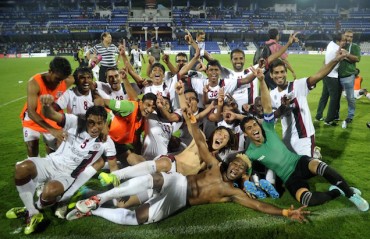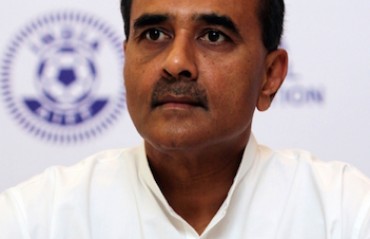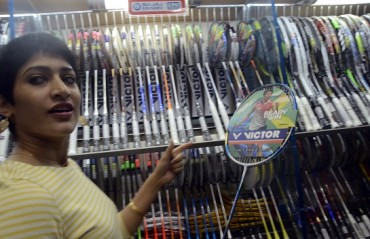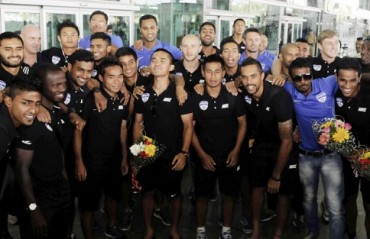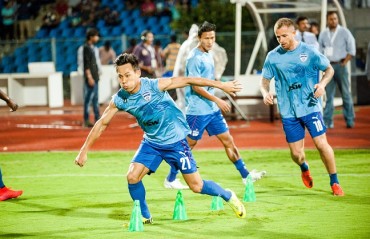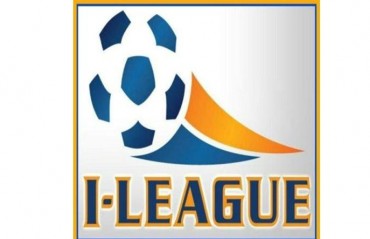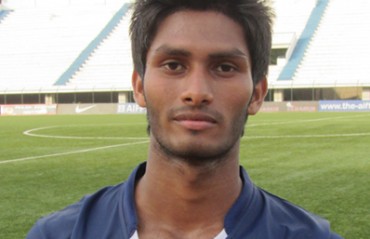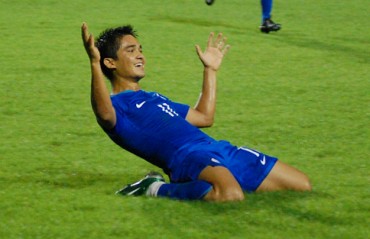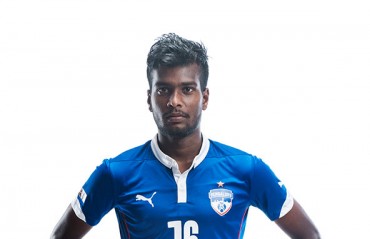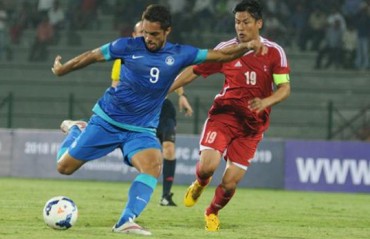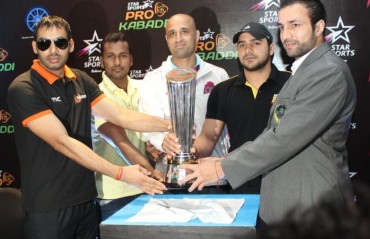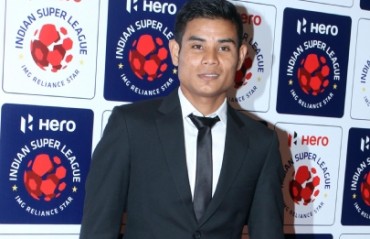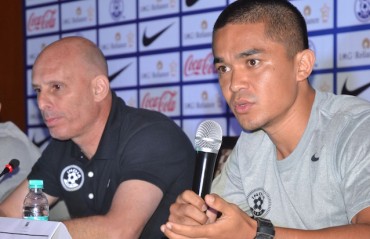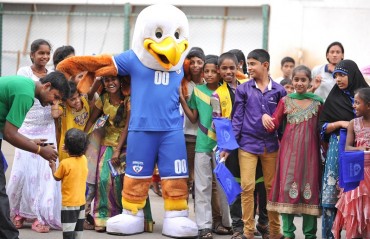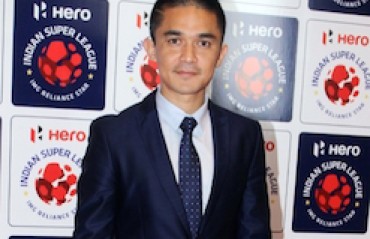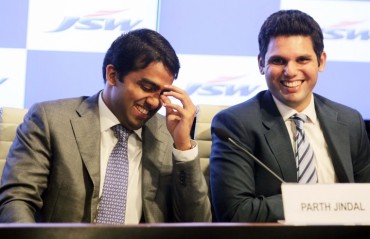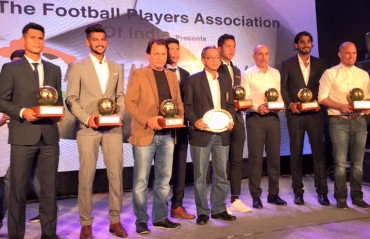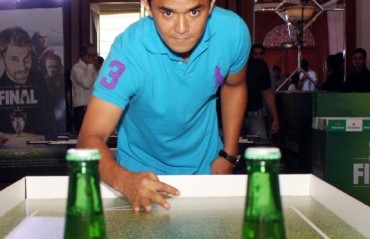#TFGtake: Chhetri's call to fellow mates gains importance over their rights under unified league
- By Chiranjit Ojha

- November 25, 2015
NATIONAL TEAM CAPTAIN Sunil Chhetri recently issued an "open letter" to his fellow professional footballers in India (FPAI), urging upon them the need to "come together" under the banner of the Football Players' Association of India. The timing of this message is very significant, considering the massive transformation that Indian football is undergoing.
In the letter, Sunil re-asserted the commitment of FPAI to look out for all players and work on their behalf to address and resolve their grievances.
Going to need the attention (and not more than two minutes) of all pro footballers in the country.@FPAI pic.twitter.com/VwBtkcG8qA
— Sunil Chhetri (@chetrisunil11) November 23, 2015
A surface level context to this statement is the meeting with "key people" at the FPAI that Sunil cites. But it can't be ignored that this appeal comes hot in the heels of FIFPro, the global union of football players that FPAI is affiliated to, celebrating its 50th anniversary. On this occasion, it has started a campaign across the globe to reach out more and more footballers and promote its values. The umbrella organization has branches all over the world and has more than 65,000 professional footballers -- male and female -- as its members, some of whom featured in this impressive video address:
Prominent Indian players, including Sunil Chhetri, Sandesh Jhingan, Romeo Fernandes, Gouramangi Singh, Eugeneson Lyngdoh and many others have also been part of an online drive to promote the core values of FIFPro, where they sent out a tweet with the same text and picture to announce their solidarity with the union.
Stronger rights and respect for all players world wide. I support @FIFPro and @FPAI pic.twitter.com/7urJ3Hs7m2
— Eugeneson Lyngdoh (@eugeneson10) November 23, 2015
But a close reading of the letter makes it seem unlikely that it is just an ad . There are specific messages being sent out here; particularly the bit about not hesitating in "try things out if it means better functioning" and the call to "not think of the past but now work together."
In the conversations surrounding Indian football, the question of players' issues has taken a back seat of late. The footballing landscape of the country is decidedly divided, with ISL and the rest existing within their own separate operative frameworks. With AIFF and IMG-R putting practically all their emphasis on ISL the rest of Indian football has suffered many setbacks. Over the last one year, I-League has lost multiple clubs and some of the most prestigious tournaments in India, including Federation Cup and the prestigious Durand Cup, have been cancelled.
Player contract norms with clubs have also taken a turn for the worse, as I-League clubs, who are forced to stay out of action for half the season because of ISL, are increasingly favouring short term 6-month contracts with most of their players. And as for ISL, they only employ about a 110-odd Indian players, leaving the majority of top division footballers out of action for the best months of the season. So the job security, for players, has been on the decline, which is a grave sign.
Added to it, the folding of so many clubs at once has left a high number of players without a team; and with just 9 clubs left in the I-League, there is just not enough room for them all. The job market for footballers in India has considerably shrunk in size. There is also the long term effect of players in those clubs' junior teams who have lost their direct avenue into top division professional football.
Significantly, FPAI, an organization featuring a number of well-known former and current Indian players like Baichung Bhutia (ex-president), Renedy Singh (current president), Sunil Chhetri and Climax Lawrence (vice presidents), NP Pradeep and Mehrajuddin Wadoo (board members) etc, has been largely silent while this has been unfolding. They haven't issued a statement yet about the players' job crisis, nor the folding of the clubs.
Even basic issues like timely payment remain a headache for players. Last season, Mohun Bagan's I-League winning campaign was repeatedly disrupted by players protesting about salary overdue. The club's title sponsors had abruptly stopped paying them, creating a financial crisis and the players were driven to the brink of revolt.
Even in ISL, Indian players have been taken advantage of. In the inaugural edition NorthEast United tied up with Shillong Lajong to use players from their roster. With the Indian players, they chose not to offer any contracts but made them play on daily wages, while the foreigners got proper contracts; a grave violation of ethics of professional football that was swept under the rugs.
A more recent example of apathy towards players would be when just a few weeks ago Atletico de Kolkata player Baljit Singh Sahni accused FC Goa's Gregory Arnolin of racially abusing him, his complaint never resulted in a formal investigation, as is the norm worldwide.
Or the fact that Thongkhosiem Haokip, one of the most successful young Indian players in ISL 2015, is getting paid only Rs 1.80 lakh, the lowest in ISL, due to stipulations placed by the ISL Draft system.
And now, all stakeholders of Indian football, including I-League clubs, ISL franchises, AIFF and IMG-Reliance are coming together to work out a merger plan to create one long-format league for the country. But one set of stakeholders have virtually no say in this enterprise of epic proportions: the players.
Many details about this new league that will have major implications for the players' livelihood are yet to be chalked out: like the number of foreign players a club is allowed to sign (AFC mandates maximum of 4 foreigners, 1 of which must be of Asian origin), the number of Under-23 players in a team, or whether they will retain the draft or adopt an open market policy. Naturally, having a say in these matters which will be debated over in the upcoming days and months is crucial for the players, and key to having that strong voice is to have the players unite under the FPAI banner.
But the biggest hurdle towards achieving that will perhaps be the "past" which Sunil appeals players to forget. Disputes within the FPAI, personal ones as well as those on principle, have often become a hindrance, reducing its potential to be a uniting force among Indian footballers.
But in the present scanrio, it's more important that ever for players to truly come together and demand more fair treatment from AIFF, the clubs, ISL franchises and all other entities that employ them. If they succeed in forcing strong clauses about protecting a player's rights into the constitution of the new league, it will go a long way towards ensuring footballers of present and future generations experience greater job secuirity, more avenues of opportunity, and get the respect they deserve as working professionals.









